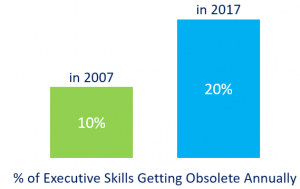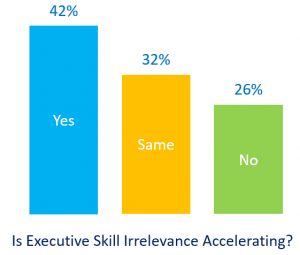By Professor Boris Groysberg, Sarah Abbott, and Katherine Connolly Baden, of Harvard Business School.
Over seven thousand executives from 145 countries recently responded to a survey about maintaining the relevance of their skills.
We distributed the survey in partnership with The Official Board, a global corporate directory of the medium and large companies; the survey data was supplemented with in-depth interviews with approximately 30 executives.
Of the 7,160 executives we surveyed, 35% are based in the United States. The United Kingdom accounts for 6% of respondents, Canada 4%, France and Germany each 3%, and India 2%.
Respondents represent the 50 key functions – CEO, CFO, CIO… – and more than 80 industries—primarily financial services, information technology, advertising marketing, and real estate.
The executives averaged nearly 19 years of professional experience prior to assuming their current position.
The Diagnosis: Skill Obsolescence is a Growing Risk for Executives.
We asked respondents to estimate the percentage of their skills that currently becomes obsolete each year.
Looking at the medians, respondents estimated that nearly 20% of their skills currently become obsolete annually; 10 years ago, they estimated, the rate of obsolescence was lower, at 10%. Only 15% of survey respondents indicated that they observed 0% skill obsolescence.
A handful of executives rejected the underlying premise of our questions about the pace of skill obsolescence. “The important skills to have in 2018 are the same skills that you needed by and large in 2017, and probably in 1917,” one CEO of a U.S. marketing company declared.
the underlying premise of our questions about the pace of skill obsolescence. “The important skills to have in 2018 are the same skills that you needed by and large in 2017, and probably in 1917,” one CEO of a U.S. marketing company declared.
Others attributed skill degradation to simple disuse: like tennis or fluency in a language, executive skills stagnate if they aren’t exercised.
The CEO of a semi-conductor company estimated that “without informal or formal continuing education, skills decay significantly in two to three years and reach the point of no return in about five to six years. “
However, a bank executive based in Burundi opined: “Certain skills are lifetime skills. If you know how to handle people, how to engage with people, you don’t quite lose that skill. It always comes back automatically.
Another executive argued that communication skills—a traditional component of the executive skill portfolio—have acquired both new urgency and new methodologies in the face of demographic changes and the primacy of social media.
What Causes Skill Slippage?
Respondents invoked many possible causes of skill irrelevance. Overwhelmingly, those causes had to do with technology: technology that provided new tools, made information that was once closely held widely available, accelerated the pace of business and disrupted the status quo.
The words disrupt and disruption were invoked by nearly 100 executives, and many others described profound changes to well-established business models. “It’s not only a risk in old-fashioned environments or industries. It’s even relevant for top tech companies,” observed a leader at an executive-search firm.
Many asserted that entrenched attitudes and indifference to innovation exacerbate the problem. As a U.S. banking executive put it, “In our industry, we are herd thinkers to a fault. We will follow each other off the cliff, and we do it every time. You can set your watch to it.”
Is Skill Irrelevance Accelerating?
Of the respondents who commented on skill obsolescence over time, 42% declared that its pace has quickened relative to 10 years ago, and 32% saw no change in the rate of skill irrelevance.
The remaining 26% who perceived a decrease in skill decline over the last decade were typically describing their own careers: earlier on, they had relied heavily on technical skills, which in their experience depreciate relatively rapidly; as senior executives, they rely more on soft skills associated with leadership, strategy, and people management.
decrease in skill decline over the last decade were typically describing their own careers: earlier on, they had relied heavily on technical skills, which in their experience depreciate relatively rapidly; as senior executives, they rely more on soft skills associated with leadership, strategy, and people management.
These “life skills,” they argued, are not subject to obsolescence. “Soft skills don’t depreciate,” said a European banking CEO. “They appreciate over time with wisdom and experience. Some of the basics about running a business don’t change.”
When asked why skills became obsolete more quickly today than 10 years ago, many respondents again named technology and its growing presence and impact. “Ten years ago, many changes were somehow continuums (smaller and slower),” one Finnish CFO observed. “Today, some changes are disruptive. The business logic of the whole industry may change, requiring totally new sets of skills.”
One respondent argued that, in some instances, skill obsolescence has sped up to the point that it can happen in an instant; his examples had to do with loss of reputational capital due to viral negative publicity about mistreatment of customers. He also noted examples of CEO turnover due to loss of support from vocal stakeholder groups.
The Prescription: How to Stay Relevant
Despite what they viewed as accelerating skill irrelevance, many executives were optimistic about their ability to stay ahead of the curve.
Overwhelmingly, they asserted that countering skill irrelevance calls for taking time today to invest in their future selves. “The speed of change necessitates a greater connectedness to new trends and innovation. What might have been enough to get ahead 10 years ago only keeps you at pace today,” one executive with a global services company observed. “It forces us to invest disproportionately in innovation.”
A technology CEO stressed identifying the particular skills that are indispensable to remain nimble: “If you have 10 or 20 skills and you try to update them, then it might be more difficult. So if you pinpoint one or two, it’s easier to update them and to keep yourself with the pace of change.”
Executives named an array of methods to stay relevant. In our interviews, many executives characterized the challenge of maintaining relevance not as an individual undertaking but as what one German executive called “a team sport.”
1. Attitude, adaptability and continuous learning
For many executives, the key to ongoing relevance has less to do with specific actions than with a flexible mindset: they typically urged openness and adaptability. “If somebody sticks to their old behaviors, that definitely will not allow them to keep up with the pace of the world in general,” a Mexican beverage-company executive warned.
By contrast, a French technology-industry CEO stressed anticipation as a skill, and pointed out that strategic adeptness can be insufficient if it isn’t accompanied by an orientation toward adaptability: “Things are really changing fast. And having a good strategic mind is fine, but you need to be able to adapt quickly and to make your company react and act quickly.”
Continuous learning could be said to be the actionable version of adaptability. “A personal commitment to continuous learning is strategic: to be informed of a new trend before the others gives you a large advantage in the long run,” said an Italian finance-company executive.
2. Self-reflection and feedback
“I focus by knowing what I want to achieve and then measuring myself against that. And then being honest if I fail, asking, ‘Why did it go well/Why didn’t it go well?’ And then using what I learn to improve either what I do or what the people around me do,” said a Europe-based chairman.
An executive based in Romania described allocating specific blocks of time for self-reflection: “I have it in my diary on a weekly basis—self-reflection. The more you know what you don’t know, the more open and capable you can become.” Some respondents described treating self-reflection as a team activity.
“I always remind myself and others that, as an exec, one not only works in the company but has to work on the company,” a German advertising executive said. “Step aside and look from a distance at what you are doing and how you are doing it. Then ask yourself: ‘Would you hire yourself?’”
Another U.S. executive said that her team regularly considers two questions that force a shift in mindset: “What would a new team do? And if we fail in four years, what would the reasons have been?”
3. Networking
Many executives rely on other people, in the form of networks—within their firms, their industries, and beyond—as their prime means of keeping up-to-date. “We use our networks very much, and we like to connect the companies and individuals in our network with each other,” said an executive at a Danish architecture firm. “And we actually do it very often without getting paid for it.”
An oil-industry executive found the model of an informal “round table” more congenial: “For me, whether it’s over lunch or dinner, it’s important to be able to sit with peers and be able to listen and learn.”
Executives highlighted conferences and training courses as good places to network with executives within one’s industry. A Latin American executive reported that his presence on social media—Twitter and Facebook and Instagram—connected him with others and elicited invitations to “projects or ideas or groups that keep me relevant.”
4. The big picture
A European CFO argued that vision, in the sense of anticipation of large-scale external trends, is a traditional managerial skill whose content is shifting with changes in the operating environment grounded in a platform economy, an open ecosystem, digitalization, and changing customer experiences and expectations.
The executive skills he deemed most fundamental are “understanding the driving forces in the competitive landscape, the capability to identify relevant global trends, in-depth understanding of value changes in society as well as where a possible disruption is coming from…and change management.”
Another executive argued for the wisdom of constructing multiple time horizons – “tomorrow, next month, next year, next five years, next thirty years”—for both visionary and competitive/defensive reasons: “to identify opportunities, threats, and missing competencies . . . that keeps you on top of the wave.”
5. Other tools: Reading and working with outsiders
Many executives make a point of reading intensively and/or widely. The aims and content of their reading vary. The CEO of a technology company reported reading peer-reviewed technical/industry-specific material “approximately two hours a day,” and often seeking out subject-matter experts for further discussion.
Another executive described launching a reading group whose focus was less technical than managerial. A third executive recommended reading as a means of educating oneself on societal trends: “Read a lot to stay up-to-date with transformations in society.”
Conclusion
While there may be disagreement as to the exact rate of change, executives agreed overwhelmingly that skill obsolescence was a fact of life in the current business environment.
To counter this trend, executives must be strategic about building and maintaining their skills sets, investing the time and effort in activities (such as reading, seeking feedback, networking, and self-reflection) that allow them to do so.
Thank you for reading our piece. We hope it resonated with you and you found it insightful and interesting. If you would like to share your story with us, we would be delighted to receive it. What steps have you taken to stay relevant in your career? What steps have you observed others taking? Please send your story to [email protected].
Professor Boris Groysberg and Research Associates Sarah Abbott and Katherine Connolly Baden of Harvard Business School prepared this piece in partnership with Thomas Lot, Founder of The Official Board. Interviews were conducted by Boris Groysberg, Sarah Abbott, Katherine Connolly Baden, and Robin Abrahams. This piece is based on a full-length article edited for The Official Board. Some respondents’ comments have been lightly edited for brevity and clarity.